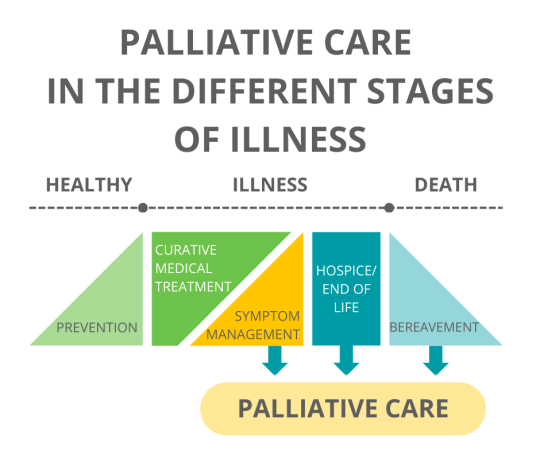When serious illness strikes, palliative care can make all the difference in how your loved one and family experience the journey.
Even so, many people are unsure of when to consider palliative care, or mistakenly assume that it’s only for those nearing the end of life.
In this article, we share how palliative care makes it easier to care for a seriously ill loved one. Learn about the common misconceptions surrounding palliative care, and explore the different care settings in Singapore. Additionally, discover how NTUC Health’s Home Care services can help families manage care at home with greater confidence.
What is Palliative Care?
Palliative care is specialised support for people living with a serious illness, such as cancer, advanced organ failure such as heart, kidney, lung diseases, dementia, or stroke.
It is often delivered by a multidisciplinary team consisting of professionals like doctors, nurses, therapists, social workers, and counsellors.
The main purpose of palliative care is to improve comfort and enhance the quality of life for both the patient and their family. This includes easing any physical pain, and offering support for their emotional, social, and spiritual needs.
For example, a palliative care team might help to manage severe nausea from chemotherapy, provide counselling for anxiety, or assist families in navigating complex medical decisions.
What You Can Expect from Palliative Care Over Time
As someone goes through a serious illness, their needs can change over time. Palliative care is designed to be flexible, offering the right kind of support at each stage of the journey. It typically focuses on three main areas:

Figure 1: Adapted from Gwyther, L. (2008). Journal of Pain and Symptom Management1
Symptom Management
Symptom management is often provided alongside treatments that aim to cure the illness or support recovery. It focuses on maximising comfort, whether by easing symptoms such as pain, nausea, and breathlessness, or by offering support with activities of daily living such as bathing or getting dressed.
Symptom management can begin from the point of diagnosis and may continue for months or even years, depending on the needs of the individual. For example, a person with heart disease may live for another 10 to 20 years with appropriate medical care.2 Palliative support can help make that time more manageable and comfortable.
Hospice Care
Hospice care typically begins when a person is nearing the end of their life, with a terminal prognosis of less than three months to a year, and when they have chosen to stop all treatments aimed at curing their illness.
The focus of care shifts entirely to ensuring their comfort, dignity and peace. Support is given to help the person live their final days in the way that feels most meaningful to them. This may include small comforts like enjoying their favourite meals and music, spending quality time with loved ones, or having support to follow a daily routine of their choice.
Bereavement Support
Palliative care doesn’t stop when a loved one passes away. Bereavement support is offered to families and those close to the person, to help them adjust to their loss and find healthy ways to cope with their grief.
This form of support can be as simple as offering a listening ear, helping someone make sense of their emotions, or connecting them with a support group.
What are the Key Benefits of Palliative Care?
Palliative care can significantly improve life for seniors and their families facing serious illness. Here’s a closer look at some of the benefits:
Greater Comfort Everyday for Your Loved One
Palliative care helps your loved one manage the daily challenges of their illness so they can live life to the fullest. With the right support, they can get more restful sleep, move around with greater confidence, and save their energy for the moments that matter most.
This enables them to stay positive and feel more in control, contributing to a better overall mood and quality of life.
Support for the Whole Family
Living with and caring for someone with a serious illness can be incredibly demanding, often leading to high levels of stress and even caregiver burnout.
Palliative care helps ease this burden by offering ongoing support and expert guidance through the caregiving journey, so caregivers don’t have to manage everything alone.
Support may include teaching practical skills like medication management or wound care, and connecting families with essential resources such as home care services, caregiving subsidies and grants to lessen financial strain.
Fewer Hospital Admissions
By proactively managing symptoms and providing strong support at home or in the community, palliative care enables your loved one to avoid unnecessary hospital stays and remain in the comfort of home, where they feel most at ease.
Where Your Loved One Can Receive Palliative Care
Palliative care can be provided in several settings, depending on your loved one’s needs and preferences. Here’s a quick look at the different options:
At Home
This is ideal for seniors who want to be in familiar surroundings and stay close to loved ones. Your loved one can receive one-on-one support such as home nursing, home hospice and home medical care to manage their symptoms and improve comfort at home. Other services such as home therapy and home personal care can also help to lighten the demands on family caregivers.
Inpatient Hospice
Inpatient Hospice Palliative Care Service (IHPCS) is a form of medical care provided in hospitals or hospice facilities for patients who require round-the-clock supervision and those with complex symptoms that are difficult to manage at home. Community hospitals also offer short-term inpatient palliative care, usually for patients who need continued support after being discharged or while arrangements are being made for care at home. A doctor will need to assess the patient’s condition and determine if hospice care is appropriate.
Palliative Day Care
Palliative day care gives patients a safe and supportive place to spend the day when their loved ones are at work or unavailable. Patients receive medical support alongside therapeutic activities that help them stay connected, uplifted, and mentally stimulated.
When to Consider Palliative Care
A common misconception is that palliative care is only for elderly people in their final days, or only for those who have decided to give up on curative medical treatments. While it does include end-of-life care, the support it offers extends far beyond that.
In reality, palliative care can and should begin much earlier, especially if you or your loved one are struggling with difficult symptoms, caregiver burnout or multiple hospital admissions.
Studies show that families and patients who start palliative care early tend to feel better overall.3 They enjoy a better quality of life, have fewer symptoms of depression, and feel more emotionally supported. They're also less likely to go through aggressive treatments near the end of life and are more likely to have clear advance care plans in place for their long-term care.
Palliative Care at Home with NTUC Health Home Care Services
Caring for a loved one at home can be deeply rewarding, but it also comes with its fair share of challenges. That's why NTUC Health offers a wide range of professional Home Care services to support seniors in the comfort of their homes, while giving caregivers a well-earned break.
Here are some services that can help your loved one live with greater dignity and ease in the comfort of home:
Home Nursing
If you have trouble managing nursing procedures like wound care, injections or tube feeding at home, Home Nursing can help. Enjoy peace of mind with our experienced registered nurses who will provide professional nursing care to ensure your loved one stays safe and comfortable.
They also offer basic caregiver training to boost your confidence in managing day-to-day caregiving responsibilities in your day-to-day caregiving. With subsidies, Home Nursing remains one of the most affordable and accessible options for families seeking care at home.
Home Medical
When your loved one is too unwell to leave the house, even a simple doctor's visit can feel like a major hurdle.
Home Medical takes the pressure off by bringing doctors right to your door, so your loved one can receive thorough medical care and symptom management without the stress of commuting, allowing them to focus on feeling better.
Home Therapy
When life-limiting illnesses make it harder for your loved one to move, swallow, or manage daily tasks, Home Therapy can help them regain strength, confidence, and independence.
Our team of physiotherapists, occupational therapists, and speech therapists will assess their needs and tailor a recovery plan that supports their daily function and comfort at home.
Home Personal Care
Need a helping hand with caregiving duties? Home Personal Care can take some weight off your shoulders.
Our friendly Care Associates can assist your loved one with activities of daily living like bathing, toileting, dressing, meal prep, in addition to light housekeeping. They also offer companionship and an empathetic listening ear. We ensure a small, regular team is assigned, so your loved one will always see a familiar face who understands their routine and preferences.
For families who need greater flexibility, our Home Personal Care+ service currently available at Woodlands and Jurong West, offers customisable support, including options for 24/7 monitoring and more intensive care when needed.
Palliative Care at Home Makes a Difference, So Why Wait?
Ultimately, home is where many seniors prefer to live out their lives.4 While this desire often means more intensive caregiving, you don’t have to do it alone.
Connect with our Home Care team today for personalised support to transform caregiving into a journey of comfort for your family.
1 Figure 1: Palliative care in the different stages of illness. (Source)
2 Patients with heart failure could live for 10 to 20 years with good medical therapy. (Source)
3 Early palliative care led to significant improvements in quality of life and less aggressive end-of-life care for cancer patients. (Source)
4 77% of seniors wish to spend their final days in the comfort of their own home. (Source)


